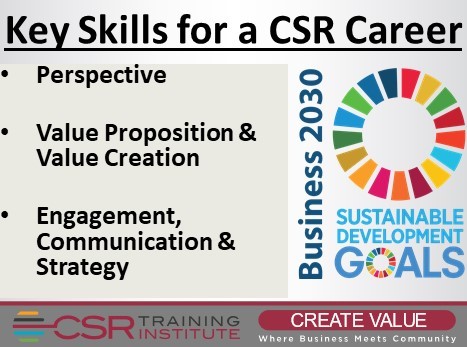What skills and attributes are most helpful to someone working in (or wanting to work in) the growing field of corporate social responsibility and private sector SDG engagement?
It’s a question I’m asked often. It is an important and fulfilling area to work in. I thought I would share some of my thoughts on what is needed to break into this area and to develop a successful career in it.
Beyond the basic skills you’ll need to succeed in just about any field these days, these are specific skills that I’ve found to be the most important to those who want to really be effective and make a difference.
I’ve listed nine skills, but they really boil down to three key themes
-
Perspective (understand and embrace the perspectives of others. Seek to understand before seeking to be understood)
-
Value (understand value propositions and value creation. Always seek to create value in a way that aligns value and interests, creating a self-interested motivation for stakeholders)
-
Engagement and Communication (pretty straight forward. Know how to strategically engage with and communicate with key stakeholders; both internal and external stakeholders. Hint – have their interests and value-propositions at the heart of the engagement)
If you have more, let me know in the comments.

1. Value-think
CSR is all about creating value for the community, business and environment, simultaneously. Never one at the expense of the other. Never lose site of that goal. It will help you build an unassailable business case for every project worth doing.
2. Stakeholder-think
CSR is all about stakeholders. Learn to identify stakeholders and make their interests your own by understanding their value and perspectives. Understanding the needs of stakeholders helps you to create value-alignment across interests, making them into self-interested collaborators and partners.
3. Alignment-think
CSR is all about meeting the interests of others in a way that also meets the interests of your business and/or project. I like to think of this as strategic empathy – understanding the position and interests of key stakeholders and finding creative ways to show how your business/project will help them while also pushing things forward for you. It is about discovering and developing value-propositions that create alignment, synergy and self-interested motivation.
4. Communication
Communication is a critical skill for CSR and just about everything else we do. Clear, concise, interest-focused and interesting communications are invaluable when it comes to developing, implementing and managing CSR projects. Acknowledge others, tell interesting stories and don’t brag.
5. Know business
CSR is all about business. So it’s your job to know business. Too often CSR is done as no-business and all philanthropy. Every CSR project must be anchored in a solid business case that makes everyone a winner.
And, while you are at it
6. Know business-speak
If you can’t make a strong internal business case for your CSR plan and project you won’t develop a strong internal support base.
Without that you will be isolated, marginalized and the first funding to be cut when things get tough will be your project.
Build the business case and then learn how to communicate it to key internal stakeholders and constituents.
7. Zero-sum Be Gone
CSR is about creating and increasing value, not simply redistributing value. One of the most valuable skills you can develop is to learn to systematically think beyond zero-sum to discover true value alignment.
Learn how to win by helping others to win too.
8. Innovation
Innovation is critical. Put on a value lens and learn to think inside, outside and around the box. Ask yourself questions that start with; What if? Would this? What about? Could we?
Surround yourself with colleagues and stakeholders who can ask you those questions, and be open enough to hear them and know that these questions may help to unlock new value.
9. Think Pain Points
What are the pain points? What does that have to do with CSR? Pain points are just that. It is what keeps your CEO awake at night. Threats, weaknesses, obstacles, challenges, the sorts of things that business has to address to survive and thrive.
CSR should be one of your business’s strategic tools for addressing pain points. A key skill for a successful CSR practitioner is to know and understand the pain points that are keeping your C-Suite team awake at nights, and to think strategically about how CSR may help address some of them.
There are other skills that will help you become a CSR superstar. But you would do well to think about and try to master these nine.

